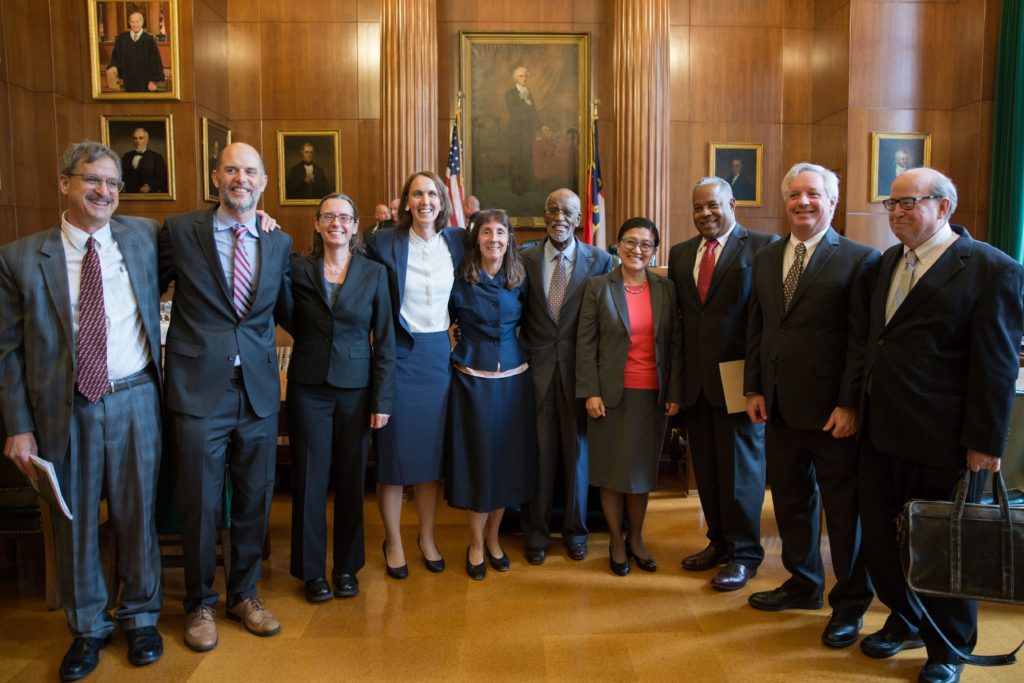CDPL’s staff has successfully halted dozens of wrongful executions, helped free innocent people from death row, and secured life sentences in cases that otherwise would have resulted in unjust executions. In 2024, CDPL helped secure the largest grant of gubernatorial clemency in North Carolina’s history. CDPL has also spearheaded groundbreaking racial justice litigation that has prevented North Carolina from carrying out any executions since 2006 and resulted in the removal of five people from death row. We play a key role in educating the public about the state’s arbitrary and racist capital punishment system. Click the links below to learn more about our work.

CDPL attorneys have either worked directly or consulted on the cases of all eight innocent men released from North Carolina’s death row since 1999. CDPL staff represented these innocent men who were in danger of execution:
- Henry McCollum — who was represented by two CDPL attorneys, along with attorneys from the law firm of WilmerHale in Boston — was freed in September 2014 after serving 30 years on death row. His attorneys successfully argued for his immediate release after DNA testing, performed by the N.C. Innocence Inquiry Commission, showed that neither McCollum nor his brother, Leon Brown, who was serving a life sentence, had any involvement in the rape and murder that they were convicted of in 1984. Read Henry and Leon’s full story here.
- A CDPL attorney helped Alan Gell win a new trial by proving that he had an airtight alibi and that prosecutors had hidden evidence that strongly suggested his innocence. The same CDPL attorney also represented Gell at his retrial, where he was found not guilty. Gell was exonerated in 2004, nine years after he was sent to death row.
- CDPL staff intervened in the case of Levon “Bo” Jones just days before his execution date. After more than a decade of work, they proved that there was no credible evidence linking Jones to the crime and that Jones had received virtually no defense from the court-appointed attorneys at his original trial. Jones was freed in 2008, after spending 13 years on death row.
- Floyd Brown was charged capitally and faced the death penalty. Mentally disabled, Brown was locked in a psychiatric hospital for 14 years because he was not competent for trial. Brown was freed in 2007 after CDPL attorneys presented evidence of his innocence, including evidence that he signed a false confession he could not even read.
CDPL has been a leading force in litigating the NC Racial Justice Act, a groundbreaking law that exposed racism in North Carolina’s capital punishment system. Our staff has been an integral part of the teams that represented five death row prisoners who proved that qualified Black jurors were systematically excluded from the juries that sentenced them to death. All five defendants were resentenced to life in prison without the possibility of parole.
In recent years, we’ve also pushed forward litigation under Batson v. Kentucky, which bars the exclusion of jurors based on race or gender, in both capital and non-capital cases. We helped expose our state courts’ failure to enforce the law, and then helped litigate the case of Christopher Clegg, who was the first person in North Carolina to have his sentence overturned due to racial discrimination against jurors of color.
In addition, CDPL has made racial equity a key area of our public advocacy work. Racist Roots is our comprehensive project on the death penalty’s deep entanglement with white supremacy. We adapted the project into a film that has been shown across North Carolina.
CDPL supported legislation that stopped North Carolina from executing people with intellectual disabilities, who cannot fully understand their crimes or participate in their defense. The law barring their execution passed in 2001. Since then, our attorneys have represented more than half of the people who have been resentenced to life in prison because of their disabilities. CDPL staff are the leading experts on intellectual disabilities and the death penalty in North Carolina, and they have consulted heavily on all the cases brought forward under the law.
CDPL played a key role in a collaborative two-year campaign that ended with then-Gov. Roy Cooper granting clemency to fifteen people on North Carolina’s death row in December 2024. All fifteen people were resentenced to life without parole. The governor’s action was the largest grant of death row clemency in North Carolina’s history and acknowledged deep injustices in the administration of the death penalty.
CDPL — and its predecessor, the North Carolina Resource Center — was also integral to the efforts of all five people granted clemency by North Carolina governors prior to Gov. Cooper. All five were spared from imminent execution.
- Charlie Mason Alston was granted clemency in 2002 after DNA evidence that might have proven his innocence was lost. His federal appeals had also been cut short when Alston’s post-conviction lawyer missed a filing deadline due to cocaine use and mental problems.
- Robert Bacon was sentenced to death even though his white co-defendant, who masterminded the crime, received a life sentence. A juror admitted that race was a factor in sentencing Bacon, who is black, to death. He was granted clemency in 2001.
- Marcus Carter represented himself at the trial that ended with an all-white jury sentencing him to death. The court had refused his requests for new lawyers, despite Carter’s complaints that his court-appointed attorneys had not met with him. He received clemency in 2000.
- Wendell Flowers presented evidence that the prosecutor made completely inconsistent arguments in Flowers’ trial and that of his co-defendant. In seeking the death penalty for the co-defendant, the prosecutor argued Flowers was “just a lookout” but in Flowers’ own trial, the prosecutor said Flowers inflicted the fatal wounds. Flowers received clemency in 1999, because of the arbitrary use of prosecutorial power in his case.
- No physical evidence linked Anson Avery Maynard to the crime for which he was convicted, and the main testimony against him came from a witness who participated in the killing and received immunity for his testimony. Maynard received clemency in 1992.
CDPL attorneys are steadfastly representing death-sentenced men and women in post-conviction proceedings, exposing serious miscarriages of justice and winning new sentences in many cases. Our attorneys and mitigation investigators, working alongside capital defenders from across the state, have won relief from death sentences for scores of people in North Carolina. They have brought to light serious evidence of prosecutorial misconduct, juror misconduct, and ineffective assistance of counsel, along with falsified DNA evidence, improper police work, and racist jury selection practices. They have also helped clients with serious mental illness and intellectual disabilities win relief from unconstitutional death sentences. Read more here about CDPL’s recent casework.
CDPL has been a tireless advocate for reforms that ensure accused people have access to all the evidence in their cases, including exculpatory evidence. We successfully pushed for open file discovery, both at trial and in post-conviction proceedings. We discovered that prosecutors had suppressed evidence of innocence in many cases.
CDPL also publicized the fallibility of eyewitness identification and advocated for more reliable procedures in line-ups and interrogations. The state now requires that lineups be conducted by an independent administrator and adhere to specific standards designed to discourage false identifications.
CDPL staff are experts in representing condemned men and women in the appeals process. We devote considerable resources to sharing that knowledge, both by offering training in specific areas of the law and by consulting on death penalty cases. CDPL staff have consulted on the cases of nearly all the death sentenced people exonerated since our founding in 1989. CDPL has also consulted on the vast majority of post-conviction cases in the past two decades in which death sentences have been overturned.
CDPL creates training programs for lawyers and law students, which are based on the most current research and information about capital litigation. CDPL ran important statewide trainings on the Racial Justice Act and the law barring execution of people with intellectual disabilities. We worked with N.C. Advocates for Justice on an award-winning training on racial profiling. CDPL also sponsors trainings for trial lawyers on how to conduct effective jury selection, which have helped to dramatically reduce the number of death sentences imposed in North Carolina.
CDPL has been a pioneer in the field of mitigation. Our investigators delve into clients’ backgrounds and social histories to uncover evidence of factors that may reduce their culpability, such as mental illness or severe childhood abuse. Our highly trained mitigation investigators also consult with and provide training to other mitigation investigators across North Carolina.
CDPL is a key source of public information about the death penalty. We are an important resource for reporters across North Carolina, and we have successfully drawn public attention to important issues surrounding capital punishment, such as innocence, racial bias, and ineffective assistance of counsel. Our work to expose unfairness has been documented in major news outlets, academic publications, and resource centers across the country. Our 2020 project Racist Roots, on the death penalty’s deep entanglement with white supremacy, received national attention.
CDPL is committed to exposing and challenging the racism inherent in the death penalty and to building an organizational culture of racial equity in all aspects of our work, from litigation and investigation to public education and advocacy. All staff and board members are encouraged to participate in ongoing racial equity training and to demonstrate the principles of racial equity through deliberate action, respectful dialogue, and continued self-reflection. Read more here about our efforts to incorporate the principles of racial equity into our everyday work.
